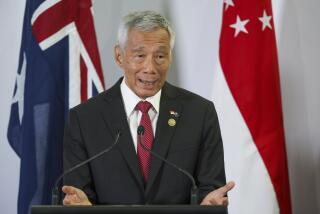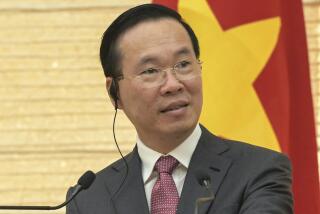Hong Kong Leader Steps Down, Denies He Was Fired by Beijing
- Share via
BEIJING — Hong Kong’s beleaguered chief executive announced Thursday that he was quitting his post for health reasons, ending more than a week of official silence and unofficial speculation.
“One hour ago, I tendered my resignation as chief executive to the central government,” Tung Chee-hwa said at an afternoon news conference in Hong Kong. “My health has been deteriorating. There is a lot of hard work ahead. I think it’s better for me to step aside, to have another person carry things through.”
Despite the widely held view that his departure is the will of a government in Beijing that had lost faith in him, Tung insisted he is not being fired.
“That is not the case at all,” he said. “The central government has repeatedly affirmed the work that I and my colleagues have done.”
Tung’s most likely successor is his second-in-command, Chief Secretary Donald Tsang. The bow-tie-wearing career civil servant, who was knighted for his service under British rule, is a skilled administrator and a more popular politician than Tung.
“He will understand the operations of government a lot better than Mr. Tung,” said Christine Loh, head of Civic Exchange, an independent think tank in Hong Kong.
Tung’s departure marks the end of a tenure that began when he was chosen by Beijing to lead the former British colony and international financial center after it reverted to Chinese rule in 1997. The 67-year-old former shipping tycoon and political novice has presided over some of the biggest problems in the island’s recent history, with mixed results. From his handling of the Asian financial crisis to the SARS epidemic to a controversial anti-subversion bill, Tung has repeatedly met with public disapproval.
“They put in charge a man who didn’t understand Hong Kong, had no clue about modern management or international politics,” said Michael DeGolyer, director of the Hong Kong Transition Project at Hong Kong Baptist University. “He was basically clueless.”
Half a million residents took to the streets in July 2003 demanding more political autonomy, and calls for Tung’s resignation ensued.
Some observers describe that as a turning point that forced Beijing to engage in a more hands-on approach in its Hong Kong dealings.
“After the mass protest, Beijing thought Hong Kong was getting politically out of control,” said Anthony Cheung, professor of public administration at City University of Hong Kong.
In December, Chinese President Hu Jintao openly criticized the performance of Hong Kong leaders, signaling the beginning of the end for Tung.
Some see Tung as a victim of the “one country, two systems” political framework Beijing created for Hong Kong. His job has been to serve two masters with often conflicting demands: the people of Hong Kong and the Communist Party in Beijing.
Although even the most skilled politician might find the task daunting, in many ways Tung was particularly unsuited for the job.
Born in Shanghai and educated in Britain, he appeared most comfortable dealing with small groups from the business elite and handling palace politics. He appeared uneasy among the masses and lacked public relations skills.
Tung took over when Hong Kong’s economy was booming.
“Beijing didn’t anticipate the dramatic challenges ahead. They thought they simply needed someone to be loyal and keep things going. That’s it,” Cheung said. “Now they realize obedience is not enough.”
Tung’s departure could also be the result of factional infighting in Beijing. He was hired, in effect, by former President Jiang Zemin, who relinquished his last official post during the current session of the annual National People’s Congress. Hu, now fully in charge, may want to clean house.
“Tung has been an embarrassment,” DeGolyer said. “Hong Kong is China’s richest city by far. Having an old incompetent left over from the Jiang era in this prominent position, [Hu] just can’t tolerate it any longer.”
Reports of Tung’s resignation surfaced last week when the news leaked that he would be named vice chairman of the Chinese People’s Political Consultative Conference, an advisory body to the Chinese legislature.
Until Thursday, neither Hong Kong nor Beijing officials had clarified Tung’s political future. The uncertainty set off a whirlwind of speculation that some felt tarnished the reputation of the territory.
More to Read
Sign up for Essential California
The most important California stories and recommendations in your inbox every morning.
You may occasionally receive promotional content from the Los Angeles Times.










